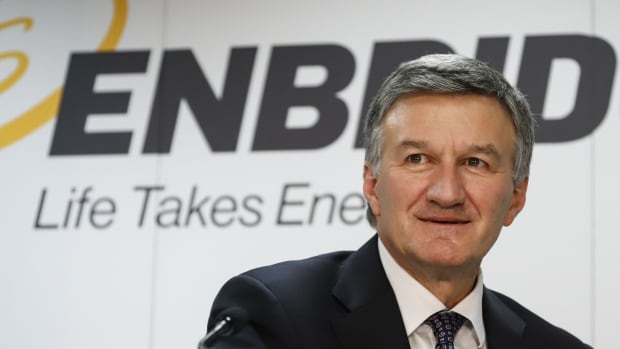The new incentives for clean energy development in the federal government’s fall fiscal update will make a real difference in helping to attract investment capital to Canada, the chief executive of Enbridge Inc. said Friday.
On a conference call to discuss the pipeline giant’s third quarter financial results, CEO Al Monaco said the Calgary-based company is encouraged by measures announced by Finance Minister Chrystia Freeland on Thursday.
“I think it’s recognized, from what I read last night, that you’ve got to be competitive. And I think, as I said, this will try to close the gap so that we get our share in Canada of investment dollars,” Monaco said.
“My read of this early on is it will be attractive for business here, both in terms of Canada attracting capital, but also for us specific to our business generally.”
As part of an effort to encourage the growth of low-carbon energy alternatives, as well as to keep Canada competitive with the U.S. and its massive Inflation Reduction Act, Freeland said Thursday the federal government will create two new federal tax credits for clean technology and low-emitting hydrogen production.
She also suggested more investments in clean energy will be outlined in the coming spring budget.
Risk of falling behind
The news was welcomed by Canadian CEOs who have been vocal in warning that businesses in this country risk falling behind if Canada doesn’t try to keep pace with the Inflation Reduction Act, which passed Congress and was signed into law by U.S. President Joe Biden in August.
The ambitious U.S. legislation provides expanded clean energy tax credits for wind, solar, nuclear, clean hydrogen, clean fuels and carbon capture, including bonus credits for businesses that pay workers a prevailing wage and use registered apprenticeship programs.
Canada’s energy sector, in particular, has announced a flurry of proposals in recent months aimed at helping to achieve this country’s climate goals of net-zero greenhouse gas emissions by 2050.
Enbridge, for example — which moves about 30 per cent of the crude oil produced in North America and transports nearly 20 per cent of the natural gas consumed in the U.S. — also has a growing offshore wind portfolio, and has proposed low-carbon projects using new technologies such as hydrogen, renewable natural gas, and carbon capture and storage.
The Pathways Alliance — a consortium comprised of Canada’s six largest oilsands companies — is pursuing multiple approaches to meet its own net-zero ambitions, including a massive proposed carbon capture and transportation line in northern Alberta but also the possible use of other technologies such as small modular nuclear reactors.
“The Pathways Alliance is encouraged by the urgency expressed by Ottawa to advance major energy infrastructure projects and to stay globally competitive on clean technology investment in Canada,” said Pathways Alliance president Kendall Dilling in a news release Friday.
Dilling added Pathways is also encouraged by the establishment of the $15-billion Canada Growth Fund, which was previously announced in April and will be launched by the end of the year. The goal of the fund is to help mitigate the risks private investors assume when they invest in new technologies.
“(The Canada Growth Fund) could offer added certainty for the major decarbonization investments we have planned and help close the gap with the United States, but we await details,” Dilling said.
The Pathways Alliance declined to comment on another measure included in Thursday’s fiscal update — a new two per cent tax on share buybacks that is intended to encourage companies to reinvest their profits in Canada and Canadian workers.
Sector under fire
The oil and gas sector in particular has come under fire from critics in recent months who have said more of the windfall profits the industry has reaped in 2022 since Russia’s invasion of Ukraine should be re-invested in local communities and green technologies, instead of share buybacks and dividends for shareholders.
Canada’s newly announced share buyback tax imitates a similar new tax on share buybacks in the U.S., also part of that country’s Inflation Reduction Act, and was praised by environmental groups Friday.
“In the last week, as oilsands companies have released their latest round of financial results, we have seen that 2022 continues to be a historic boom year for the sector — and that companies continue to use their windfall profits to reward shareholders at record levels,” clean energy think-tank the Pembina Institute said in a release.
“In past booms, some of those profits would stay in the country and have been reinvested into their future operations. Oil demand is set to decline this decade, and to stay competitive in a low-carbon energy future, Canada’s oil and gas sector must make concrete plans to invest in the decarbonization projects that will future-proof their own operations.”
On Friday, Enbridge announced it earned $1.28 billion, or 63 cents per share, in its latest quarter, up from $682 million, or 34 cents per share, in the same quarter last year.
Operating revenue grew to $11.57 billion in the company’s third quarter, compared with $11.47 billion in 2021.
Source link
Related

























